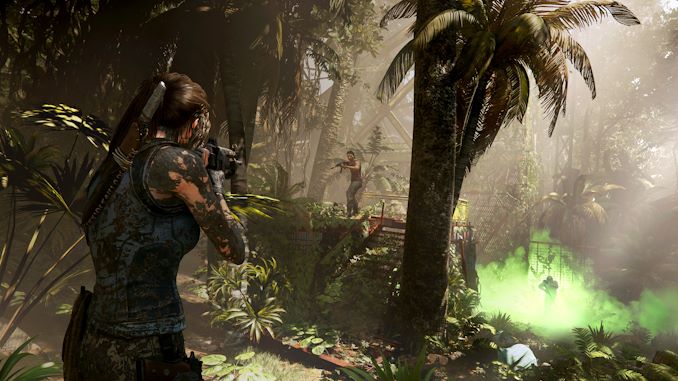Upgrading from an Intel Core i7-2600K: Testing Sandy Bridge in 2019
by Ian Cutress on May 10, 2019 10:30 AM EST- Posted in
- CPUs
- Intel
- Sandy Bridge
- Overclocking
- 7700K
- Coffee Lake
- i7-2600K
- 9700K
Gaming: Shadow of the Tomb Raider (DX12)
The latest instalment of the Tomb Raider franchise does less rising and lurks more in the shadows with Shadow of the Tomb Raider. As expected this action-adventure follows Lara Croft which is the main protagonist of the franchise as she muscles through the Mesoamerican and South American regions looking to stop a Mayan apocalyptic she herself unleashed. Shadow of the Tomb Raider is the direct sequel to the previous Rise of the Tomb Raider and was developed by Eidos Montreal and Crystal Dynamics and was published by Square Enix which hit shelves across multiple platforms in September 2018. This title effectively closes the Lara Croft Origins story and has received critical acclaims upon its release.
The integrated Shadow of the Tomb Raider benchmark is similar to that of the previous game Rise of the Tomb Raider, which we have used in our previous benchmarking suite. The newer Shadow of the Tomb Raider uses DirectX 11 and 12, with this particular title being touted as having one of the best implementations of DirectX 12 of any game released so far.
| AnandTech CPU Gaming 2019 Game List | ||||||||
| Game | Genre | Release Date | API | IGP | Low | Med | High | |
| Shadow of the Tomb Raider | Action | Sep 2018 |
DX12 | 720p Low |
1080p Medium |
1440p High |
4K Highest |
|
All of our benchmark results can also be found in our benchmark engine, Bench.
| AnandTech | IGP | Low | Medium | High |
| Average FPS |  |
 |
 |
 |
| 95th Percentile |  |
 |
 |
 |
Unfortunately our overclocked system was having issues with the SoTR test, but our results show that from 1440P onwards, there should be some good parity between the chips.












213 Comments
View All Comments
kgardas - Friday, May 10, 2019 - link
Indeed, it's sad that it took ~8 years to have double performance kind of while in '90 we get that every 2-3 years. And look at the office tests, we're not there yet and we will probably never ever be as single-thread perf. increases are basically dead. Chromium compile suggests that it makes a sense to update at all -- for developers, but for office users it's nonsense if you consider just the CPU itself.chekk - Friday, May 10, 2019 - link
Thanks for the article, Ian. I like your summation: impressive and depressing.I'll be waiting to see what Zen 2 offers before upgrading my 2500K.
AshlayW - Friday, May 10, 2019 - link
Such great innovation and progress and cost-effectiveness advances from Intel between 2011 and 2017. /sYes AMD didn't do much here either, but it wasn't for lack of trying. Intel deliberately stagnated the market to bleed consumers from every single cent, and then Ryzen turns up and you get the 6 and now 8 core mainstream CPUs.
Would have liked to see 2600K versus Ryzen honestly. Ryzen 1st gen is around Ivy/Haswell performance per core in most games and second gen is haswell/broadwell. But as many games get more threaded, Ryzen's advantage will ever increase.
I owned a 2600K and it was the last product from Intel that I ever owned that I truly felt was worth its price. Even now I just can't justify spending £350-400 quid on a hexa core or octa with HT disabled when the competition has unlocked 16 threads for less money.
29a - Friday, May 10, 2019 - link
"Yes AMD didn't do much here either"I really don't understand that statement at all.
thesavvymage - Friday, May 10, 2019 - link
Theyre saying AMD didnt do much to push the price/performance envelope between 2011 and 2017. Which they didnt, since their architecture until Zen was terrible.eva02langley - Friday, May 10, 2019 - link
Yeah, you are right... it is AMD fault and not Intel who wanted to make a dime on your back selling you quadcore for life.wilsonkf - Friday, May 10, 2019 - link
Would be more interesting to add 8150/8350 to the benchmark. I run my 8350 at 4.7Ghz for five years. It's a great room heater.MDD1963 - Saturday, May 11, 2019 - link
I don't think AMD would have sold as many of the 8350s and 9590s as they did had people known that i3's and i5's outperformed them in pretty much all games, and, at lower clock speeds, no less. Many people probably bought the FX8350 because it 'sounded faster' at 4.7 GHz than did the 2600K at 'only' 3.8 GHz' , or so I speculate, anyway... (sort of like the Florida Broward county votes in 2000!)Targon - Tuesday, May 14, 2019 - link
Not everyone looks at games as the primary use of a computer. The AMD FX chips were not great when it came to IPC, in the same way that the Pentium 4 was terrible from an IPC basis. Still, the 8350 was a lot faster than the Phenom 2 processors, that's for sure.artk2219 - Wednesday, May 15, 2019 - link
I got my FX 8320 because I preferred threads over single core performance. I was much more likely to notice a lack of computing resources and multi tasking ability vs how long something took to open or run. The funny part is that even though people shit all over them, they were, and honestly still are valid chips for certain use cases. They'll still game, they can be small cheap vhosts, nas servers, you name it. The biggest problem recently is finding a decent AM3+ board to put them in.